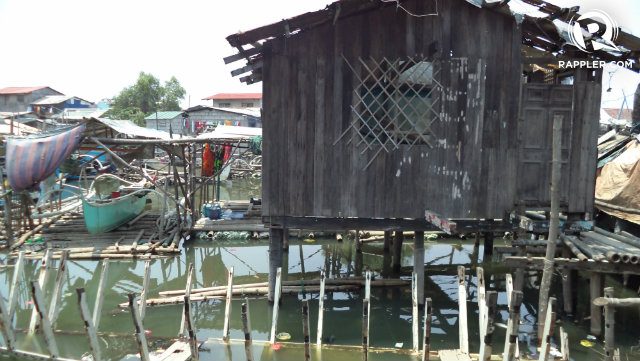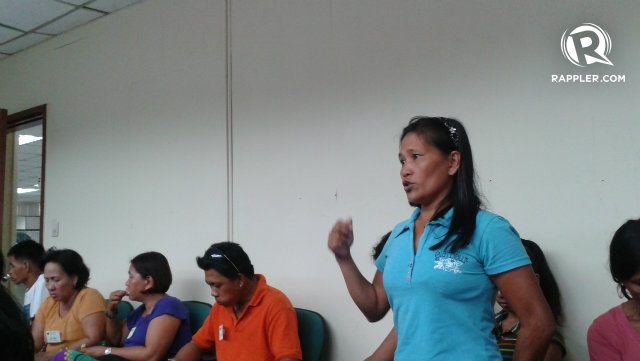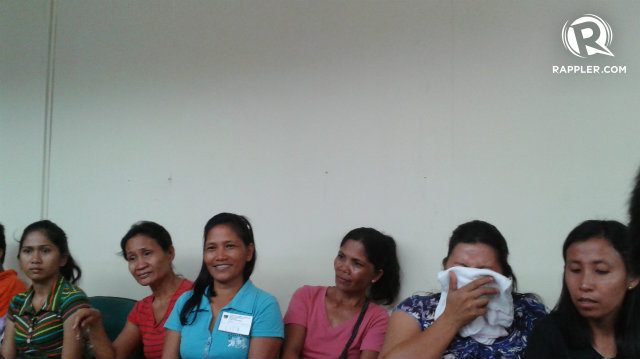SUMMARY
This is AI generated summarization, which may have errors. For context, always refer to the full article.

MANILA, Philippines – Expensive electricity and water charges, the lack of livelihood opportunities, and the remote location of resettlement areas. These are just some of the factors contributing to the problems of hunger and poverty in resettlement areas.
On Friday, April 4, families relocated to Bulacan and Rizal from “danger zones” in parts of Quezon City where they used to live, brought their complaints to the Department of Social Welfare and Development (DSWD) and non-governmental organizations (NGOs). (READ: Relocation of Manila estero families)
The danger zones had been described as being prone to floods, earthquakes, and other natural disasters.
Representatives of the concerned families said they were shown model units before being relocated, but upon arrival, their houses turned out to be different. Even the hollow block walls were “chalky.”
“Parang minadali ang construction,” Nic Salameda of Tahanan Foundation said. (It looks like construction was rushed.)
He added that some families sold their units and moved back to Manila to find work. This has tended to break families apart – parents would work in Manila, leaving their children behind.
“Bago ilipat mga pamilya, dapat areglado lahat. Hindi lang bahay, pati social services” he said. (Before families are transferred, everything should be in order. Not just houses but also social services.)
Families also said that schools and markets are too far. One grandmother hires a tricycle for P70/day to take her grandchildren to school, “Dahil malayo, madaling araw dapat lumakad na, nakakatakot naman sila paglakarin.” (Because of the distance, they should start to be on their way by dawn. It’s scary to just let them walk.) (READ: The future of rural roads)
Another mother complained about the lack of daycare centers.
The families stay in the houses for free during the first year but should start paying rent afterwards. The usual charge for water is P7/container, and for electricity, P25/night.

Hungry homes
Besides expenses to worry about, something more basic such as food is also a problem. Lita Diaz, a mother of 4, was relocated from Barangay Damayan in Quezon City to Barangay Muzon in Bulacan.
“Nagkaroon nga kami ng bahay, hindi naman pwedeng kainin pintuan at bintana,” Lita said. (Although we had a house, we couldn’t eat its doors and windows.) For a living she makes suman or rice cakes, while her husband works in construction. “Minsan may pera, minsan wala,” Lita shared. “’Di permanente trabaho niya. Minsan may gawa, mas madalas wala.”
As a result, her family makes do with instant meals that lack nutrition. “Sa relocation, dalawang beses lang kami kumakain. Sa Maynila, tatlong beses. Sinusubukan naming kumita pero napakahirap,” she added.
“Tsitserya at kalahating kilong bigas pinagkakasya ko.” (Junk food and half-a-kilo of rice is what I try to make do with.) Lita usually buys small bags of fish crackers, each bag costing P1. She asks neighbors for rice. (READ: Junk food vs Good food) Her total budget for the family’s meal is only P5.
Her children go to school empty-handed, “Nagtitiis silang walang baon, gusto nila makatapos,” Lita whispered. Her children would ask for P1 each so they could buy cheap snacks at school, but she gives them water instead. Lita does the same – she fills her rumbling stomach with water instead of food. (READ: Food myths)
“’Di porke’t busog, malusog,” Skilty Labastilla of the Institute of Philippine Culture warned. (Being full does not mean being healthy.)
Mothers like Lita want to start their own vegetable gardens, however, there are not enough spaces in the resettlement areas. “Mahal tubig. Imbes ipandilig, iinumin na lang namin,” they added. (Water is expensive. Instead of using it for watering, we’d rather drink it.)
During the long hours that Lita stays under the sun carrying baskets of suman, she only has one thing in mind – will she earn enough to feed her children today? (READ: Why many of the hungry are women)

4Ps
Fides Bagasao, community organizer and social activist, stressed that families should not be evicted unless livelihoods are secured. Age limitations, she said, must also be adjusted.
Some of these families are beneficiaries of the DSWD Pantawid Pamilyang Pilipino Program (4Ps), the DSWD’s flagship poverty alleviation program. 4Ps provides cash grants on condition that families send their children to school and they have regular health check-ups.
Although grateful for 4Ps, some mothers said the program in itself is not enough. “Hindi namin inaasa lahat sa 4Ps, dahil kulang din naman. Ang problema ay wala kaming hanapbuhay,” said a mother who was relocated from Tondo to Bulacan. (We’re not totally depending on 4Ps because it’s not enough. The problem is, we don’t have livelihood.)
Out of poverty, some parents choose quick-fix solutions:
- Pulling their children out of school
- Asking their children to work
- Spending less on nutritious meals
- Troubled children doing drugs (i.e., rugby)
- Burying oneself in loans
Labastilla called these “negative coping strategies.” “Pag nagkapatung-patong mga ito, mahirap nang makaalis. Lalong maghihirap.” (When these pile up one on top of another, it’s difficult to get out. We become more hard up.)
The issue of hunger is not readily addressed because poverty gets in the way, Labastilla argued.
He advised the government to always consult the public whenever they are preparing anti-poverty programs, “Hwag kaligtaan ang boses ng mahihirap.” (Do not forget the voice of the poor.) The government should focus on empowering the citizens, instead of harboring dependency, he added.

Brainstorming
In response to the gripes, DSWD pledged to work with NGOs in thinking of ways to alleviate hunger. The consultation with relocated families is the first of the many steps DSWD-STB is planning to make this year.
Marife Leon of DSWD’s Sustainable Livelihood Program (SLP) encouraged families to directly communicate with DSWD to ask for assistance, “Pwede silang sumulat sa amin.” (They can write us.)
SLP, in partnership with TESDA, provides skills training. It also links beneficiaries to government agencies and private companies for employment opportunities. SLP likewise provides financial assistance to those who wish to venture into business.
However, not everyone is capable or willing to start their own business. “’Pag naubos na puhunan nila, wala na ulit sila income,” Fe Sumanon, a local government unit (LGU) social worker, said. (When their capital runs out, they once again don’t have income.)
Sumanon, together with NGOs Urban Poor Associates (UPA) and CO-Multiversity, argued that the government should focus more on providing sustainable livelihoods that can provide families with a daily wage.
Celia Santos of UPA suggested that prior to relocating families, LGUs and concerned government agencies like DSWD, the National Housing Authority (NHA), and the Department of Labor and Employment (DOLE) must prepare a “skills map” – so that relocated families can be matched with job opportunities close to their new homes. The families may also be hired during the construction of the resettlement areas.
The NGOs urged the government to provide an interim assistance for relocated families, lasting from 6 months to 1 year. “’Don’t just leave them without livelihood,” Santos said.
Bagasao, however, emphasized that not everyone is well aware of DSWD programs; hence the government must work on reaching out to more people.
Nuns from the Little Sisters of Jesus demanded that someone should be on top of catering to the needs of relocated families. “Sino ba in charge? Parang wala.” (Who’s in charge? There doesn’t seem to be anyone.)
Social protection
The Department’s Social Technology Bureau (STB) initiated the dialogue as part of its plans to design new programs addressing hunger within poor communities.
To address the issue of hunger in resettlement areas, DSWD-STB is currently studying the possibility of establishing community-based food banks.
Anna Oidem, OIC-Division Chief of STB, said that her team has been studying food banks for nearly two years. They are hoping to pilot the program in selected communities by June.
STB will take into consideration all the suggestions made by NGOs and the families themselves. Social protection, according to DSWD, seeks to reduce poverty and vulnerability among the marginalized. It has 4 components:
- Labor market programs: employment opportunities
- Social welfare: support minimum basic requirements of the poor (i.e., 4Ps)
- Social insurance: (i.e., PhilHealth)
- Social safety nets: address effects of shocks on vulnerable groups (i.e., disasters)
The Philippine Development Plan 2011-2016 seeks to provide “better and improved quality of life.” The plan is to be carried out not just by DSWD, but by other government agencies as well.
“Sana magkatulungan tayo. Bubuo kami ng system para sa community-based food banks. Pero as much as possible, iiwasan natin magkaroon ng dependency,” John Calidguid of STB said. (I hope we can help each other. We will create a system for community-based food banks. But as much as possible, we will avoid creating a dependency.) – Rappler.com
DSWD SLP encourages communities to identify families in need of employment assistance. They may send their requests or questions to livelihood@dswd.gov.ph. They may also write to DSWD SLP Director Georgina Ann Hernandez (DSWD Batasan Hills, Quezon City). SLP office: 951-28806.
Add a comment
How does this make you feel?
There are no comments yet. Add your comment to start the conversation.